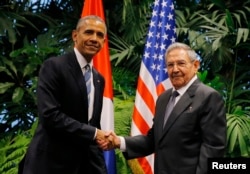Dozens of U.S. farm and agribusiness groups Thursday urged President-elect Donald Trump to build upon progress made by the Obama administration in relations with Cuba, calling trade with the former Cold War foe particularly important at a time of a severe downturn in farm incomes.
The agricultural trade groups stated their views in a letter sent to Trump, who is to be inaugurated Jan. 20.
"As a broad cross-section of rural America, we urge you not to take steps to reverse progress made in normalizing relations with Cuba, but also solicit your support for the agricultural business sector to expand trade with Cuba," the letter said.
"It's time to put the 17 million American jobs associated with agriculture ahead of a few hardline politicians in Washington," the letter concluded.
Signatories included a wide range of agricultural trade groups, from the American Farm Bureau and American Feed Industry Association to the soy bean, corn, rice, wheat, peas, beans, cattle, poultry lobbies and other associations. The letter was arranged by the Washington-based Engage Cuba Coalition and USA Rice.
Agricultural organizations in states that Trump won, such as Idaho, Alabama and Georgia, were also signatories.
Trump, a Republican, has said he will dismantle the still fragile detente begun by President Barack Obama two years ago unless Cuba gives the United States a better deal, while providing no specifics.
The letter was sent before the White House announced Thursday that it was ending a policy that granted residency to Cubans who arrived in the United States without visas, the latest bid by Obama to make his Cuba policy irreversible.
Trump is expected to review the Cuba engagement upon taking office and has named Jason Greenblatt, a Trump Organization executive and chief legal counsel, as negotiator for sensitive international issues, including Cuba.
Under an exception to the U.S. trade embargo from the year 2000, Cuba may import agricultural products for cash. The letter calls on Trump to allow normal trade financing and credit so the sector can better compete for the Cuban market.
While the sector has sold billions of dollars in products to Cuba over the years, the letter said sales have steadily declined as the embargo makes it difficult to compete with other suppliers. Cuba imports some $2 billion in food annually.
The signatories cited a deep dip in farm income to bolster their argument that U.S. farmers needed more trade.
"Net farm income is down 46 percent from just three years ago, constituting the largest three-year drop since the start of the Great Depression," the letter said.






